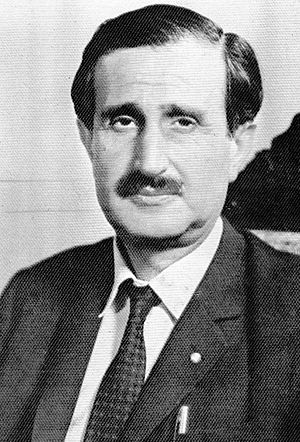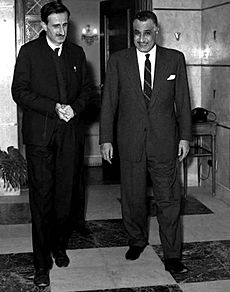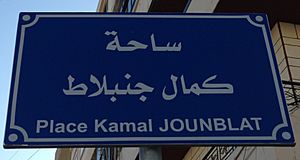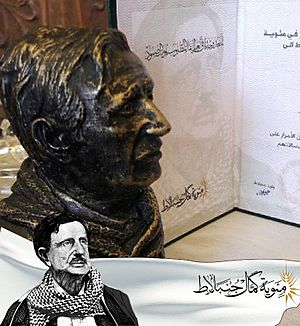Kamal Jumblatt facts for kids
Quick facts for kids
Kamal Jumblatt
|
|||||||||||||||||||||||||||||||||||||||||||||||||||||||||||||||
|---|---|---|---|---|---|---|---|---|---|---|---|---|---|---|---|---|---|---|---|---|---|---|---|---|---|---|---|---|---|---|---|---|---|---|---|---|---|---|---|---|---|---|---|---|---|---|---|---|---|---|---|---|---|---|---|---|---|---|---|---|---|---|---|
|
كمال جنبلاط
|
|||||||||||||||||||||||||||||||||||||||||||||||||||||||||||||||
 |
|||||||||||||||||||||||||||||||||||||||||||||||||||||||||||||||
| Leader of the Progressive Socialist Party | |||||||||||||||||||||||||||||||||||||||||||||||||||||||||||||||
| In office 1 May 1949 – 16 March 1977 |
|||||||||||||||||||||||||||||||||||||||||||||||||||||||||||||||
| Preceded by | Post established | ||||||||||||||||||||||||||||||||||||||||||||||||||||||||||||||
| Succeeded by | Walid Jumblatt | ||||||||||||||||||||||||||||||||||||||||||||||||||||||||||||||
|
|||||||||||||||||||||||||||||||||||||||||||||||||||||||||||||||
| Personal details | |||||||||||||||||||||||||||||||||||||||||||||||||||||||||||||||
| Born | 6 December 1917 Moukhtara, Chouf, Mutasarrifate of Mount Lebanon, Ottoman Empire |
||||||||||||||||||||||||||||||||||||||||||||||||||||||||||||||
| Died | March 16, 1977 (aged 59) Baakleen, Chouf, Mount Lebanon, Lebanon |
||||||||||||||||||||||||||||||||||||||||||||||||||||||||||||||
| Cause of death | Assassination | ||||||||||||||||||||||||||||||||||||||||||||||||||||||||||||||
| Resting place | Mukhtara Palace | ||||||||||||||||||||||||||||||||||||||||||||||||||||||||||||||
| Political party | Progressive Socialist Party | ||||||||||||||||||||||||||||||||||||||||||||||||||||||||||||||
| Spouse | May Arslan | ||||||||||||||||||||||||||||||||||||||||||||||||||||||||||||||
| Children | Walid Jumblatt | ||||||||||||||||||||||||||||||||||||||||||||||||||||||||||||||
| Parents | Fouad and Nazira Jumblatt | ||||||||||||||||||||||||||||||||||||||||||||||||||||||||||||||
| Alma mater | St. Joseph University Sorbonne University Lebanese University |
||||||||||||||||||||||||||||||||||||||||||||||||||||||||||||||
Kamal Fouad Jumblatt (Arabic: كمال فؤاد جنبلاط; 6 December 1917 – 16 March 1977) was an important Lebanese politician. He started the Progressive Socialist Party and led the Lebanese National Movement during the Lebanese Civil War. He was a strong supporter of the Palestine Liberation Organization until he was assassinated in 1977. Kamal Jumblatt wrote over 40 books on many topics, including politics, philosophy, and religion. In 1972, he received the International Lenin Peace Prize. He was the father of Walid Jumblatt, another well-known Lebanese leader.
Contents
Early Life and Education
Kamal Jumblatt was born on 6 December 1917 in Moukhtara, a town in Lebanon. He came from the powerful Jumblatt family, who were traditional leaders of the Lebanese Druze community. When Kamal was only four years old, his father, Fouad Jumblatt, was sadly killed in 1921. After this, his mother, Nazira Jumblatt, took on a big political role in their community for the next twenty years.
In 1926, Kamal Jumblatt began his studies at the Lazarus Fathers Institute in Aintoura. He finished his elementary school there in 1928. He earned his high school diploma in 1936, studying French, Arabic, science, and literature. He then got a philosophy diploma in 1937.
Jumblatt continued his education in France at the Sorbonne University. There, he studied psychology, civil education, and sociology. He returned to Lebanon in 1939 when World War II started. He then studied law at Saint Joseph University, finishing in 1945.
Starting His Political Career
Kamal Jumblatt worked as a lawyer in Lebanon from 1941 to 1942. He even became the official state lawyer for the Lebanese Government. In 1943, when he was just 26, he became the leader of the Jumblatt family after his cousin Hikmat Jumblatt died. This brought him into Lebanese politics.
In September 1943, Kamal Jumblatt was elected to the National Assembly (like a parliament) for the first time. He represented Mount Lebanon. He joined a group that opposed the current President, Bechara El Khoury. Later, he signed an important change to the constitution. In 1946, he became a minister for the first time, in charge of economy.
By 1947, even though he was re-elected, he felt that making changes through the existing political system was very difficult.
Founding the Progressive Socialist Party
Kamal Jumblatt officially started the Progressive Socialist Party (PSP) on 1 May 1949. The PSP was a socialist party that wanted a government without religious divisions (called secularism). It was against the way Lebanese politics was divided by different religious groups. In reality, the party was mostly led and supported by members of the Druze community, especially the Jumblatt family.
In 1949, Jumblatt strongly spoke out against the execution of political leader Antoun Saadeh. In 1951, he organized the first meeting of Arab Socialist Parties in Beirut. Before the 1952 elections, he announced a new opposition group. There were clashes between his supporters and security forces, and some people died. After this, he gave a famous speech saying, "Today, our party was baptized with blood." He was re-elected as a deputy for the third time that same year.
Jumblatt often wrote articles in Al Anbaa, a newspaper he founded in 1951. He often criticized President Bechara El Khoury. In 1952, he helped organize a meeting that called for the President to resign. This pressure led to the President stepping down that year.
The 1958 Revolt
In 1952, after President Bechara El Khoury resigned, Jumblatt's group supported Camille Chamoun for president. Chamoun was elected in September 1952.
In 1953, Jumblatt was re-elected as a deputy for the fourth time. He started a new group called the Popular Socialist Front and led the opposition against President Chamoun. During his time as president, Chamoun made Lebanon very close to the United States and the United Kingdom. These countries were involved in creating a group called the Baghdad Pact. Many people who supported pan-Arabism (a movement to unite Arab nations) saw this as outside control.
Jumblatt supported Egypt when Israel, France, and the United Kingdom attacked it in the Suez War of 1956. However, President Chamoun and some Christian leaders in Lebanon quietly supported the invasion. This made the religious tensions in Lebanon much worse, and both sides started getting ready for conflict.
In 1957, Jumblatt lost the parliamentary elections for the first time. He complained that the elections were unfair. A year later, he became a main leader of a big political uprising against Chamoun's government, which was mostly led by Maronite Christians. This soon turned into street fights. The uprising was supported by Syria and the newly formed United Arab Republic. The uprising ended when the United States sent its U.S. Marine Corps to Beirut to support Chamoun's government. After this, a political agreement was reached, and Jumblatt's choice, Fuad Chehab, became the new President.
Uniting the Opposition

In 1960, Jumblatt led the Afro-Asian People's Conference. That same year, he started the National Struggle Front (NSF), a group that brought together many nationalist deputies. He was re-elected as a deputy for the fifth time, and the NSF won 11 seats in the Lebanese Parliament. From 1960 to 1961, he was the Minister of National Education, and then Minister of Public Work and Planning. From 1961 to 1964, he served as Interior Minister.
In 1964, he won the parliamentary elections for the sixth time. In 1965, he began bringing together Arab nationalist and progressive politicians into a new group. In 1966, he was appointed Minister of Public Work and Minister of Post, Telegraph and Telephone. He also represented Lebanon at the Congress of Afro-Asian Solidarity and led a group to People’s Republic of China.
He supported the Palestinians in their fight against Israel. He also wanted to gain support from the Palestinian fedayeen (fighters) who were based in Lebanon's refugee camps. Many Christians in Lebanon did not like the large number of Palestinian refugees. But Jumblatt worked to build a strong opposition group around the ideas of the Palestinian movement. He called for a new Lebanon that was secular, socialist, and Arab, and wanted to end the system of religious divisions in politics. He started bringing together unhappy Sunnis, Shi'a, and leftist Christians into a national opposition movement.
Leading to Civil War
In 1968, Jumblatt was re-elected as a deputy for the seventh time. In 1970, he became Interior Minister again. This was a reward for his last-minute support for Suleiman Franjieh in the presidential election, which Franjieh won by just one vote. As Interior Minister, Jumblatt made the Lebanese Communist Party (LCP) and the Syrian Social Nationalist Party (SSNP) legal. In 1972, Jumblatt received the Lenin Peace Prize from the Soviet Union. He was re-elected as a deputy for the eighth time that same year. In 1973, he was chosen as Secretary General of the Arab Front, a group that supported the Palestinian movement.
The 1970s in Lebanon saw growing tension between the Christian-led government and Muslim and leftist groups. These groups wanted more representation in the government and a stronger connection to the Arab world. The conflict was similar to the 1958 rebellion, following religious and political lines.
Both the opposition and their Christian opponents formed armed groups. The risk of war grew steadily. Jumblatt organized his own PSP into an armed force. He made it the main part of the Lebanese National Movement (LNM), which was a group of 12 left-wing parties. He also led this group. The LNM wanted to end the system where government jobs were divided by religious groups, which they felt was unfair to Muslims. The LNM was also joined by Palestinian groups and had good relations with the Palestine Liberation Organization (PLO). The involvement of Palestinians was a new development compared to the 1958 conflict.
The Lebanese Civil War
In April 1975, a series of killings led to full-scale fighting in Beirut. In August 1975, Jumblatt announced a plan to change the Lebanese political system. The LNM openly questioned the government's right to rule. In October 1975, more fighting broke out and quickly spread across the country. This was the start of the Lebanese Civil War.
Between 1975 and 1976, Jumblatt was the main leader of the Lebanese opposition in the war. With help from the PLO, the LNM quickly took control of almost 80% of Lebanon. They were close to winning the war. In March 1976, Jumblatt visited Hafez al-Assad in Syria. It became clear that Syria did not agree with the LNM's goals. This ended the political relationship between them.
Syria sent its army into Lebanon on 1 June 1976. The Syrian government said they feared the Christian-led government would collapse, which might lead to an Israeli invasion. About 40,000 Syrian soldiers invaded Lebanon in 1976 and quickly stopped the LNM's progress. A ceasefire was announced, and the fighting calmed down. Later that year, an agreement was signed that allowed Syrian soldiers to stay in Lebanon as a peacekeeping force under the Arab League.
During the civil war, Kamal Jumblatt's son, Walid Jumblatt, was kidnapped by Christian fighters but was released after former president Camille Chamoun helped. Kamal Jumblatt himself was also targeted in an assassination attempt during this time.
Personal Life
Kamal Jumblatt was born into the Druze faith. However, he also learned about Christian teachings at his school, the Lazarus Fathers Institute. He would attend church services with his classmates. Years later, he was even heard saying Catholic prayers when his cousin Hikmat Joumblatt was dying.
On 1 May 1948, Jumblatt married May Arslan in Geneva. May was the daughter of Prince Shakib Arslan, whose family was another important Lebanese Druze family. Their only son, Walid Jumblatt, was born on 7 August 1949.
Kamal Jumblatt gave many speeches and wrote over 1200 articles in both Arabic and French. People described him as a socialist who was influenced by European leftist ideas. He published his memories in a book called I Speak for Lebanon.
Death

On 16 March 1977, Kamal Jumblatt was shot and killed in his car near the village of Baakleen in the Chouf mountains. His bodyguard and driver also died in the attack. The attackers were never officially identified.
Some people suspect the Ba'ath Party was involved. In 2005, a former leader of the Lebanese Communist Party, George Hawi, said in an interview that Rifaat al-Assad, who was the brother of Syria's president at the time, was behind the killing.
Kamal Jumblatt's son, Walid Jumblatt, immediately took over as the main Druze leader in Lebanon and as the head of the PSP. He was elected leader of the PSP on 1 May 1977. In 2015, Walid Jumblatt accused two Syrian officers of being responsible for his father's death.
Kamal Jumblatt Centennial (1917-2017)
To celebrate 100 years since Kamal Jumblatt's birth, the Progressive Socialist Party launched the "Kamal Jumblatt Centennial" event. During this celebration, a small statue of Kamal Jumblatt, along with a certificate signed by the PSP chief Walid Jumblatt and a yellow pin badge, was given to over 22,000 supporters and veterans of the PSP, PLA, and National Movement across Lebanon.
See Also
 In Spanish: Kamal Jumblatt para niños
In Spanish: Kamal Jumblatt para niños
 | Jewel Prestage |
 | Ella Baker |
 | Fannie Lou Hamer |


